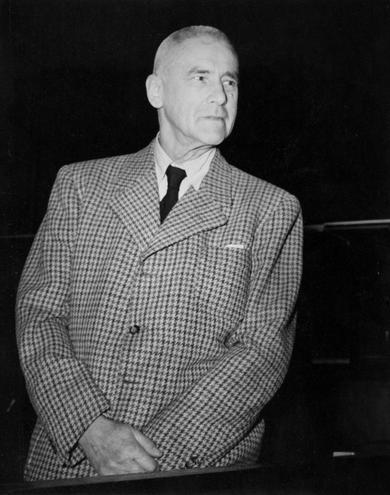- Wilhelm Frick
Infobox Chancellor
name = Wilhelm Frick
nationality = German
caption =
birth_date = birth date|1877|3|12|df=y
birth_place =Alsenz , Bavaria, Germany
death_date = death date and age|df=yes|1946|10|16|1877|3|12
death_place =Nuremberg , Germany
party =National Socialist German Workers Party (NSDAP)
spouse = Elisabetha Emilie Nagel (married 1910, divorced 1934), Margarete Schultze-Naumburg (married 1934)
alma_mater =University of Munich
University of Göttingen
University of Berlin
University of Heidelberg
order = Reich Minister of the Interior
term_start = 1933
term_end = 1943
president =Paul von Hindenburg (1933-1934)Adolf Hitler (1934-1943)
chancellor =Adolf Hitler
predecessor =Franz Bracht
successor =Heinrich Himmler
order2 = Protector of Bohemia and Moravia
term_start2 = 24 August 1943
term_end2 = 4 May 1945
appointed2 =Adolf Hitler
predecessor2 =Konstantin von Neurath (titular)Kurt Daluege ("de facto")
successor2 =Edvard Beneš (President ofCzechoslovakia )Dr. Wilhelm Frick (12 March 1877ndash 16 October 1946) was a prominent Nazi official, serving as
Minister of the Interior of theThird Reich . He was executed forwar crimes after the end ofWorld War II .Early life and family
Frick was born in
Alsenz , Bavaria, Germany, the last of four children of teacher Wilhelm Frick the elder and his wife Henriette (née Schmidt). He was educated inKaiserslautern and studied jurisprudence atHeidelberg , graduating in 1901. He joined the Bavarian civil service in 1903, working as a lawyer at the police headquarters in Munich. He was made a "Bezirksamtassessor" in 1907 and rose to the position of "Regierungsassessor" by 1917. He took part in theBeer Hall Putsch (November 1923), at which time he was director of the Munich "Kriminalpolizei ". He was one of those arrested and imprisoned for theputsch and was tried for treason in April 1924. He was given a suspended sentence of 15 months' imprisonment and was dismissed from his police job.In 1910, Frick married Elisabetha Emilie Nagel (1890 - 1978) in
Pirmasens , they had two sons and a daughter. The marriage ended in an ugly divorce in 1934. Later that year Frick remarried, to Margarete Schultze-Naumburg (1896 - 1960), the former wife ofPaul Schultze-Naumburg . Margarete gave birth to a son and a daughter.Education
Frick finished school in
Kaiserslautern . Between 1896 and 1900, he studied at theUniversity of Munich , theUniversity of Göttingen and theUniversity of Berlin and completed his degree inlaw in Munich. Frick earned adoctor of laws from theUniversity of Heidelberg in 1901.Third Reich career
Wilhelm Frick joined the
NSDAP in September 1925 and worked for an insurance company.Frick was elected to the "Reichstag" in May 1924 and associated himself with the radical
Gregor Strasser ; he was "Fraktionsführer" for the NSDAP in 1928. He was appointedMinister of the Interior and of Education forThuringia in 1930.When Hitler came to power in January 1933, Frick was appointed Minister of the Interior, one of only three Nazis in the original Hitler Cabinet, and was responsible for drafting many of the laws that set up the Nazi regime. In distinction to most other Central European countries, the Minister of the Interior of the Reich did not control the nation's police forces, which were controlled by the Ministers of the Interior of the individual German States. By far the largest State was
Prussia , whereHermann Göring was nominated as Minister of the Interior. Frick lost the post of Interior Minister in 1943 toHeinrich Himmler ; who had already marginalised Frick's power in 1936, when Himmler had been appointed Chief of the German police, thereby placing the police under the control of the SS and making it virtually independent of the Interior Ministry. Frick wasMinister without Portfolio until August 1943 when he lost out in a power struggle with Himmler. He was then appointed to the ceremonial post of Protector of Bohemia and Moravia.Prague , the capital of theProtectorate of Bohemia and Moravia was one of the last Axis-held cities to fall at the end of World War II in Europe.Frick was arrested and tried before the International Military Tribunal at Nuremberg, where he was the only defendant besides
Rudolf Hess who refused to testify on his own behalf. His role in formulating the Enabling Act as Minister of the Interior, the laterNuremberg Laws (as co-author withWilhelm Stuckart ) and as controller of Germanconcentration camp s led to his conviction for planning, initiating and waging wars of aggression,war crimes andcrimes against humanity . He was sentenced to death on 1 October 1946, and was hanged about two weeks later on 16 October. Of his execution, journalistHoward K. Smith wrote::The sixth man to leave his prison cell and walk with handcuffed wrists to the death house was 69-year-old Wilhelm Frick. He entered the execution chamber at 2.05 a.m., six minutes after Rosenberg had been pronounced dead. He seemed the least steady of any so far and stumbled on the thirteenth step of the gallows. His only words were, "Long live eternal Germany," before he was hooded and dropped through the trap.
ee also
*
Prague Offensive
*Prague uprising
*End of World War II in Europe
Wikimedia Foundation. 2010.
